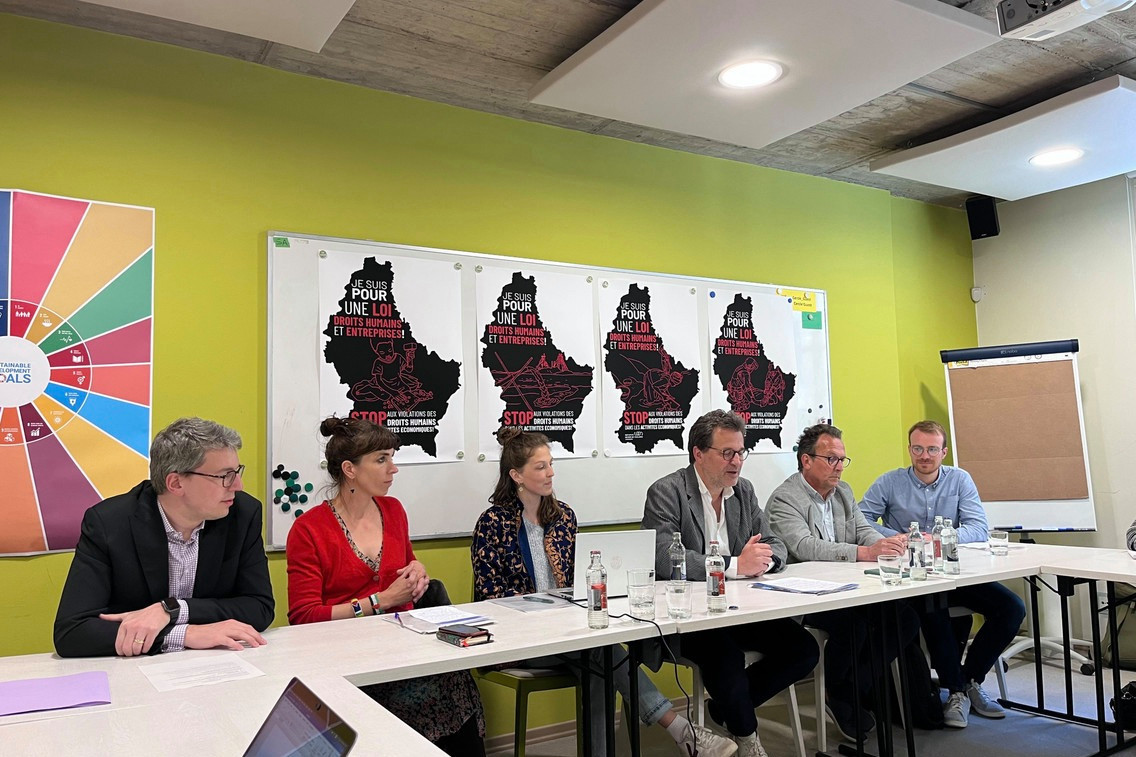The ASTM group has long advocated for binding due diligence rules that would force companies to assess their human rights and environmental impact along their supply chains. But its work has largely fallen on deaf ears as government parties are waiting for an EU directive to set bloc-wide regulations.
“We must act now,” said Jean-Louis Zeien, who coordinates the due diligence initiative, at a press conference. “They’re waiting for the slow train of the EU.”
The European Commission last year adopted a draft directive, which the European Coalition for Corporate Justice (ECCJ) as “wilfully ignor[ing] many harmful business operations.” The document remains to be validated by the European Parliament and the council.
An EU directive on conflict minerals took years of negotiation, Zeien said. Proposed in 2014, it was adopted in 2017 and member countries should have transposed it by 2021. Luxembourg only at the start of May presented a draft law in parliament.
Together with déi Lénk and the Pirates, who together occupy four seats on the opposition bench of parliament, the due diligence initiative on 16 May submitted its proposal for a draft law to parliament.
National regulator
To fall under the scope of the proposed text, companies but meet two out of three criteria: employing at least 250 people, annual turnover exceeding €50m or a profit of more than €43m. This would apply to less than 10% of companies registered in Luxembourg, Zeien said, explaining that most businesses in the country are small and medium-sized enterprises.
However, it would include all sectors of the economy, including the financial sector and the fund industry. An EU proposal, which excludes these sectors and has a narrower scope, would force only 0.4% of companies to adhere to due diligence obligations, according to an estimate cited by Zeien.
Under the proposal, companies would have to carry out an impact assessment and remedy any negative effects on human rights, the climate and environment. A national supervisory body would ensure that the assessments are correctly carried out and issue sanctions of up to 10% of turnover in case of violations.
The biggest difference between the EU directive and the ASTM proposal is the inclusion of the financial sector and fund industry. “It’s more holistic, more ambitious,” Zeien said.
“Not revolutionary”
Dozens of companies in Luxembourg have human rights and due diligence standards as part of a national action plan. “But it’s very important to say that voluntary measures aren’t enough,” , a member of parliament for déi Lénk, said.
“It’s not revolutionary; it’s common sense,” added (Pirate Party), who explained that the proposal merely implemented agreements that Luxembourg is already signatory to, such as the Paris climate agreement and OECD and UN guidelines. “At its core, it’s a déjà-vu.”
The government in its 2018 coalition agreement had said it would investigate the possibility of national legislation on human rights due diligence.
A 2021 by the University of Luxembourg had said the grand duchy could already begin preparing national legislation and that this would not be mutually exclusive with an EU directive, which only sets minimum standards that member countries are free to exceed.
“The results of this study are crystal clear. National legislation is possible,” said Zeien. “We regret that the government didn’t let actions follow words.”
The study had said by setting high standards nationally, Luxembourg could lobby at EU level in an “assertive and pre-emptive manner.” Instead, the country is waiting, even though neighbours like France and Germany have adopted supply chain laws, with legislation currently making its way through parliament in the Netherlands.
Support from young Greens
Several high-profile cases of human rights violations are linked to companies present in Luxembourg. This includes Israeli spyware firm NSO, which operates several back-office entities in the grand duchy. Through one of them, the controversial Pegasus software for €6m, used to spy on journalists and opposition politicians.
Mining company Ternium, which controls steel businesses throughout the Americas, has been linked to the of community activist Antonio Díaz Valencia and lawyer Ricardo Arturo Lagunes Gasca, who were representing the interests of indigenous groups in dispute with the Las Encinas iron ore mine in Mexico.
“The only thing the minister can do today is write a letter to the company,” said Zeien, referring to letters sent to both companies by foreign minister (LSAP) on behalf of the government.
But investigations have also resulted in allegations of child labour at hazelnut farms in Turkey that supply confectionary company Ferrero, which is headquartered in Luxembourg. The company in response to the claims established a partnership with the International Labour Organisation in support of projects to end child labour in seasonal farm work.
Also present at the press conference on Tuesday and in a show of support was , co-president of the youth branch of déi Gréng. “We think a supply chain law must exist,” he said. With the parent party--a member of the government coalition--not present to support the proposal, Costa said that “we are in a different position than our mother party”, which cannot unilaterally support legislation.
Following the submission of the proposal to parliament, it is forwarded for an opinion to the state council and the government and will be discussed in committee in parliament. However, it could very well end up being stuck there if majority parties decide not to proceed with a vote.
